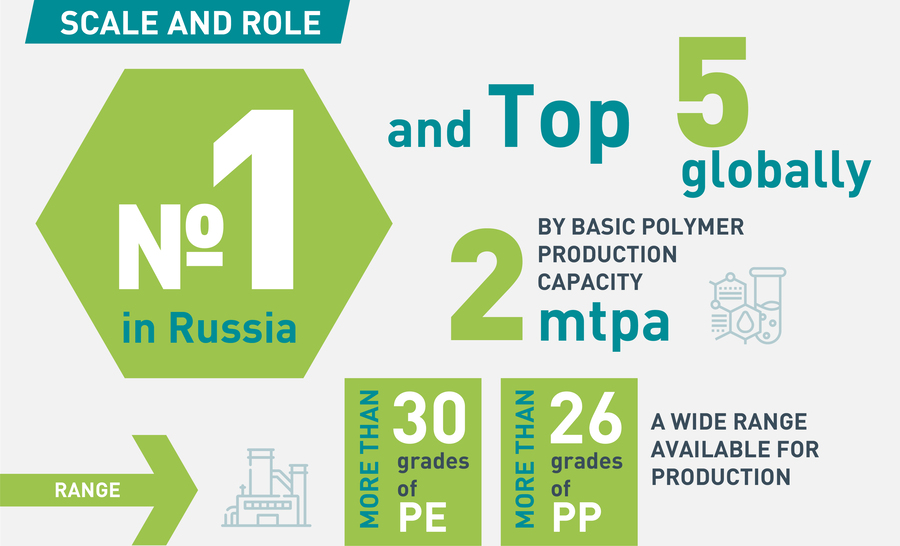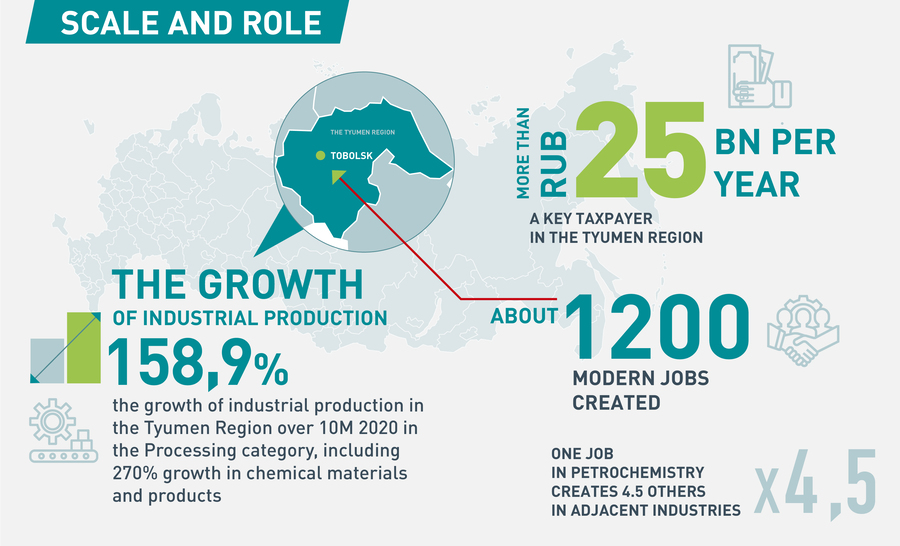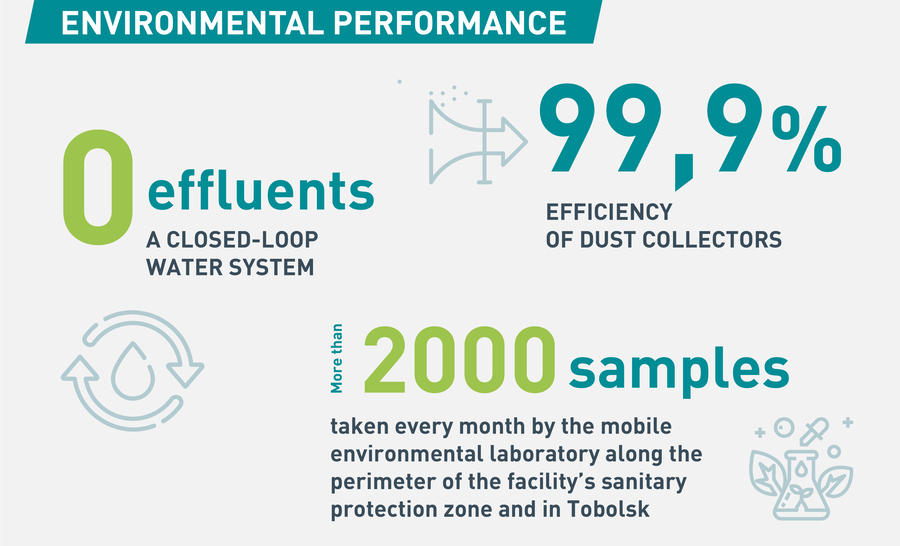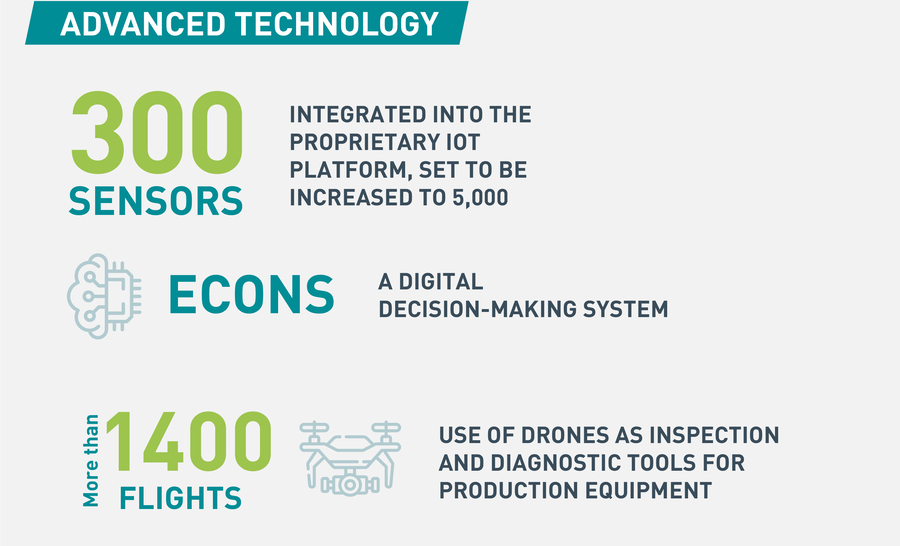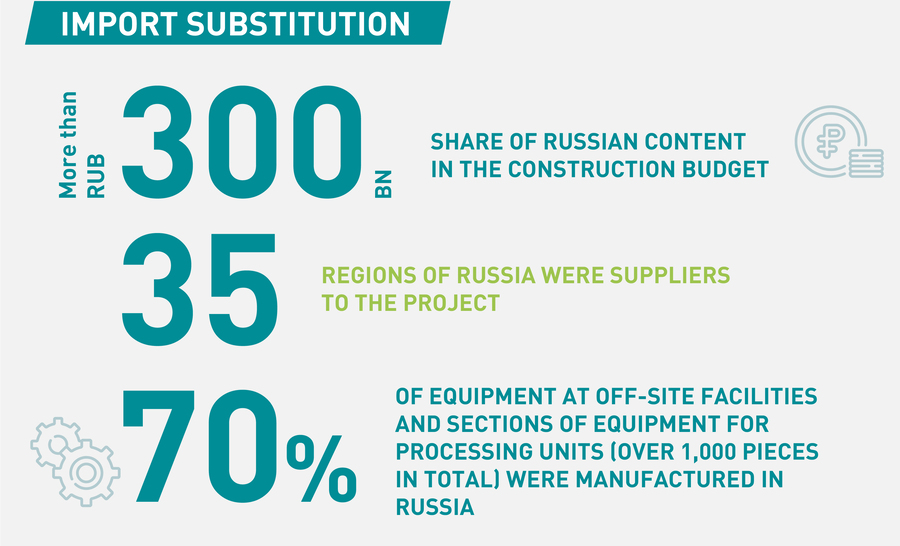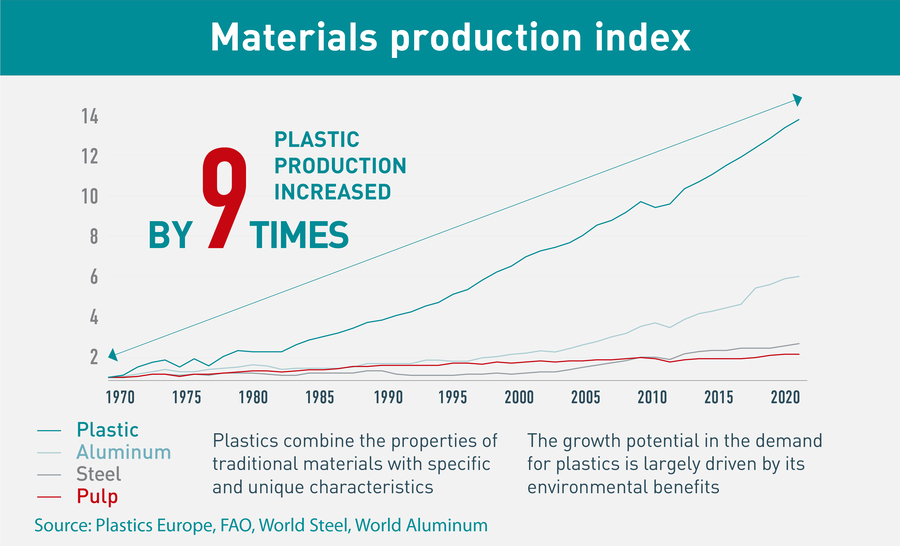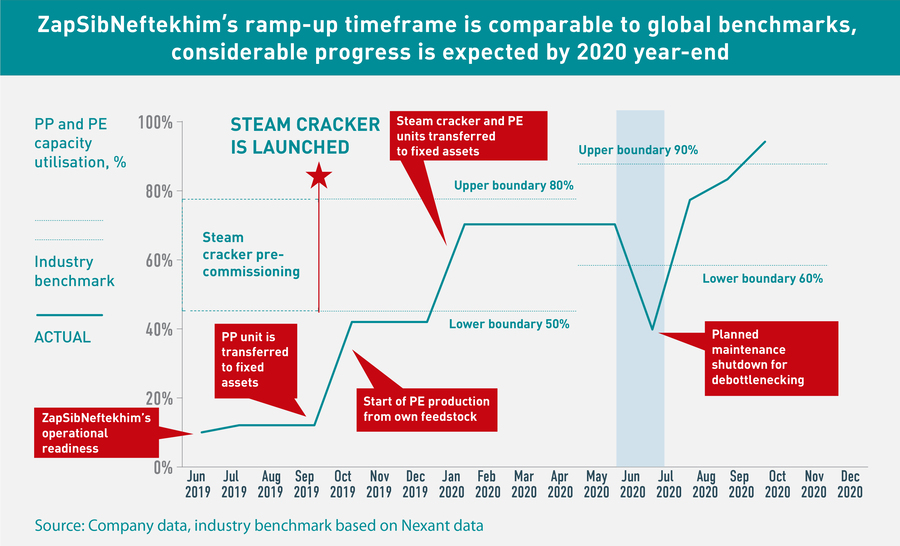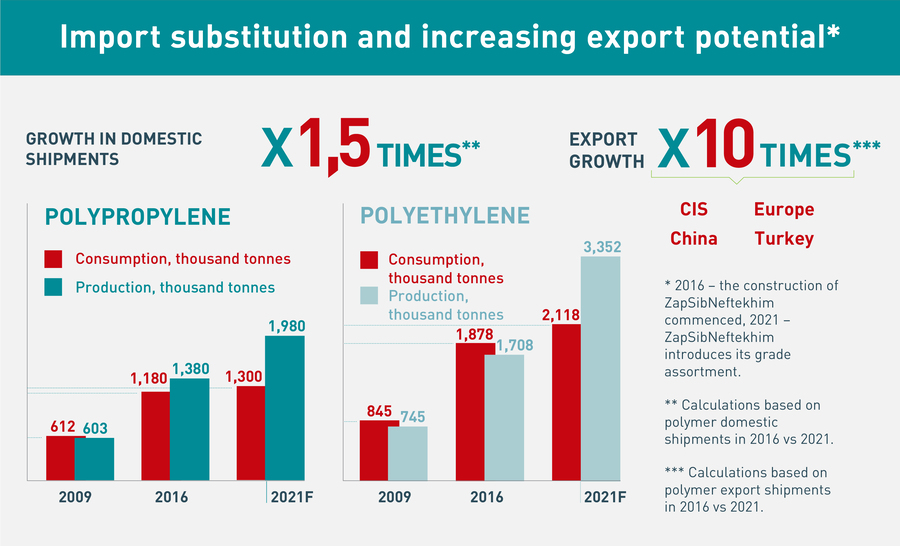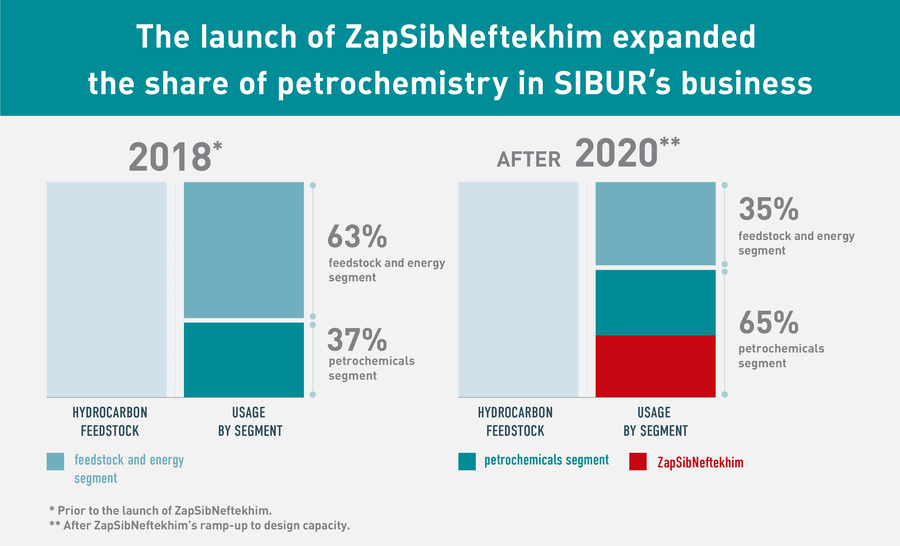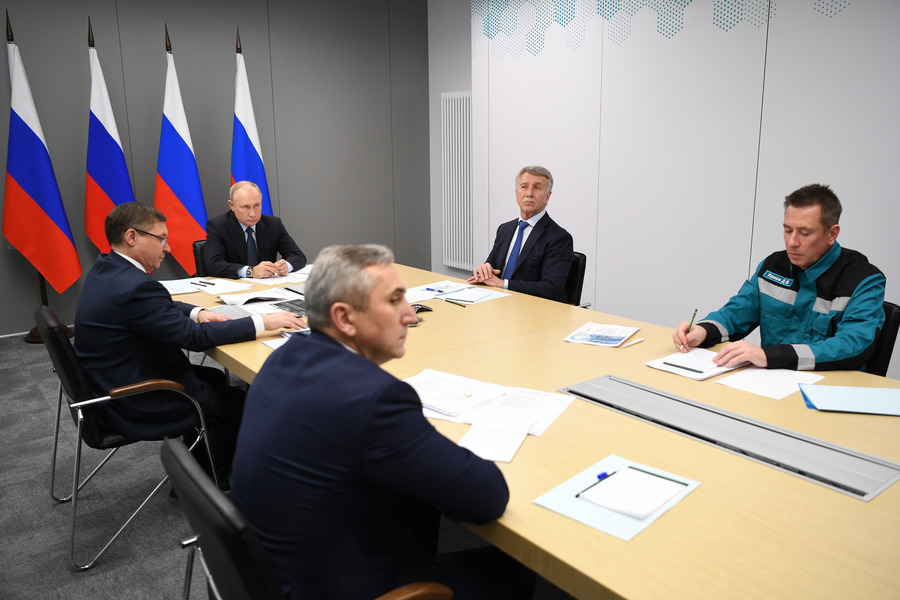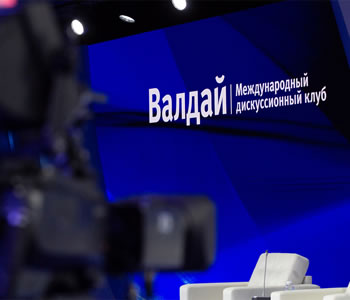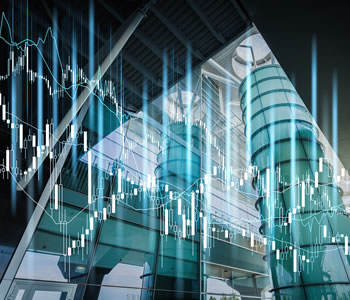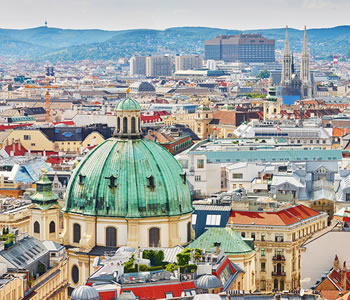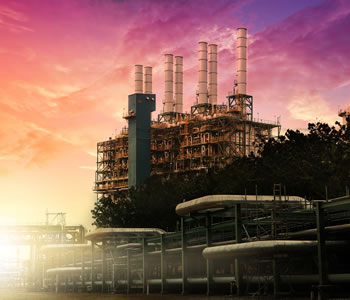The President’s working visit to the petrochemical complex began with an introductory tour. In the facility’s central control room, Dmitry Sokolov, Director of the Pyrolysis plant, told the head of state about the automated production control system at the plant and pointed out that the central control room “looks like an air traffic control centre, so we call it the molecule control centre.” ZapSibNeftekhim employs residents of the Tyumen Region as well as people from other regions, with young talent accounting for about 12% of the total headcount. Dmitry Konov, the Chairman of SIBUR Holding’s Management Board, told the President about the Mobile Walkaround function used at the facility, which allows an inspector to monitor the situation at ZapSibNeftekhim’s production sites and promptly communicate information about malfunctions using a mobile terminal, thus reducing the repair time. During the tour, social programmes for the facility’s employees, including medical care, were also touched on.
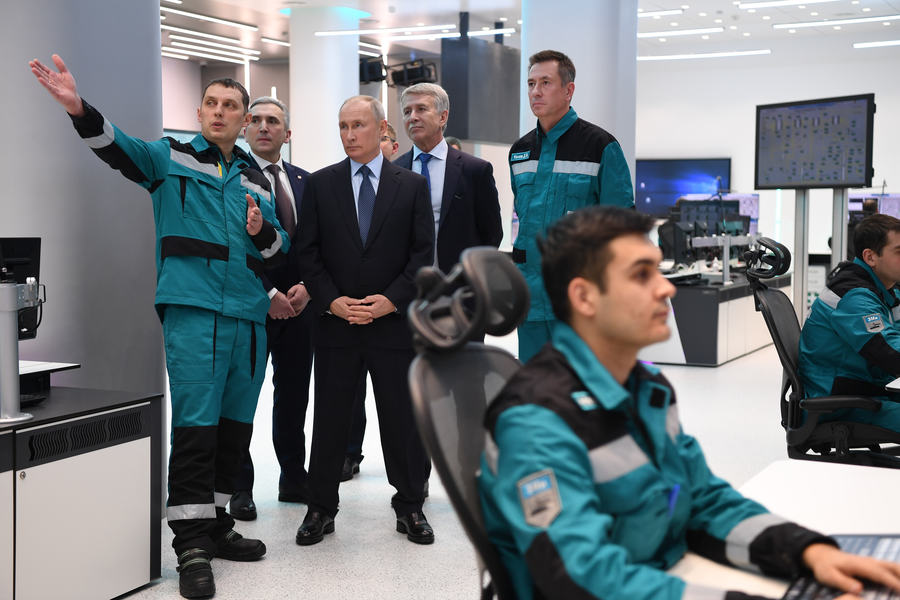
Vladimir Putin's introductory tour of Zapsibneftekhim.
The President noted that the facility was impressive: “It’s just like a city, a project of epic proportions." He said, “the new complex will play a significant role in substituting polyethylene and polypropylene imports, and will promote an increase in the feedstock conversion rate and a more efficient use of resources.” The President made a special mention of environmental performance: “The production of plastics generates 13 times less carbon dioxide emissions per tonne of product than the production of other materials – aluminium, copper, steel, iron. Still, it is vital that the facility’s activities fully comply with Russian and international environmental standards, so the enterprise has adopted eco-friendly production practices, and has put in place a closed-loop water supply system that does not generate wastewater.” According to Vladimir Putin, in recent years Tobolsk “has turned into a global petrochemical hub” – in just seven years, “two major enterprises have been built, placing the region and the entire country among the leaders.”
“At ZapSibNeftekhim, SIBUR has successfully implemented the best currently available solutions and practices. The new production facility uses state-of-the-art equipment and the latest digital technologies, some of which were developed in-house,” said Dmitry Konov, Chairman of SIBUR’s Management Board. “ZapSibNeftekhim also represents a major step forward in sustainable development as it produces materials with a low carbon footprint. It is equally important to note that the project called for a rethink on the approach to business management, team building and employees’ professional competencies, since the potential of even the most advanced production site can only be unlocked by its people. And today these people demonstrate that the Russian petrochemical industry can compete on an equal footing with established global leaders.”
A project that offers economic opportunities
The construction of ZapSibNeftekhim was an important step in SIBUR’s transformation into a global petrochemical player. By localising the supply of equipment, materials and services during the construction of ZapSibNeftekhim, SIBUR was able to secure over RUB 300 billion of supplies from 35 regions of Russia.
ZapSibNeftekhim’s capacity will enable the production of Russian alternatives of high-density polyethylene, used mainly to produce pipes, containers and packaging (an import substitution rate of up to 85%). An import substitution rate of up to 95% can be achieved in the production of stretch film, pipes and cable insulation, as well as in the key propylene copolymer segments (injection-moulded products, pressure and non-pressure pipes, and compounds). By 2025, the complex’s export volumes have the potential to reach 1.5 mtpa.
A contribution to the local economy
The President noted that the facility was impressive: “It’s just like a city, a project of epic proportions.” He said, “the new complex will play a significant role in substituting polyethylene and polypropylene imports, and will promote an increase in the feedstock conversion rate and a more efficient use of resources.”
Over the 10 months of 2020, the launch of ZapSibNeftekhim enabled a 158.9% growth of industrial production in the Processing category in the Tyumen Region (including a 270% increase in the production of chemicals and chemical products). The Tyumen Region is one of Russia’s leading regions in terms of industrial production index growth rate at 124.1% (industrial production decreased by 3.1% year-on-year on average across Russia in January–October 2020).
The facility coming online gave a boost to the development of adjacent industries using ZapSibNeftekhim’s products as feedstock. In particular, a standalone unit of Kamsky Plant of Polymeric Materials (KZPM) constructed a new 10 mtpa facility near ZapSibNeftekhim to produce polymer film (FFS).
Another example of the project’s synergetic effect is Tobolsk-based iPlast, the first producer of plastic pallets in the region with a capacity of 700 thousand pallets per year. ZapSibNeftekhim’s polyethylene serves as the main feedstock for this type of product.
With a headcount in Tobolsk of around 4,000 people, SIBUR is one of the largest employers in the Tyumen Region.
Russian petrochemistry: a path to development
On the day of the visit, Vladimir Putin chaired a meeting devoted to the development of the petrochemical industry.
The meeting’s participants, Deputy Prime Minister Alexander Novak, Deputy Prime Minister Yuri Borisov, Chairman of VEB.RF Igor Shuvalov, and CEO of RDIF Kirill Dmitriev, praised SIBUR’s efforts to develop petrochemistry in Russia.
А meeting devoted to the development of the petrochemical industry was held in videoconference mode.
In his opening speech, Vladimir Putin once again highlighted ZapSibNeftekhim’s efficient performance and said that the Government would continue to create a favourable environment for the development of refining capacities and related investment activities: “The success of a petrochemical project depends on its efficient construction, and optimal project costs and completion times. With this in mind, outdated building regulations are now being abolished, sanitary standards and requirements are being simplified, and incentives are being introduced to promote the adoption of advanced construction materials and digital technology. These efforts should certainly be carried forward into the future to provide a positive climate for further investment.”
Among the urgent tasks the President mentioned was the creation of stable demand for Russian petrochemical products. “We need to create a market for our products, prioritising the domestic one,” he said.
Once ZapSibNeftekhim is fully ramped up, it will triple SIBUR’s polymer production capacity, converting about 3 million tonnes of hydrocarbon feedstock into higher value-added products with export potential. Russia will be one of the top 10 producers of basic polymers in the world
In his presentation, Dmitry Konov spoke about global changes in the industry in recent years, brought about by the rapid development of the oil, gas, gas processing and transportation industries in the US and growing investment in integrated refining and petrochemical facilities in China.
Along with an increase in demand for polymers, the industry witnessed a decrease in production costs for all manufacturers, and as a result, the profitability of all petrochemical players fell, which adds another layer of complexity to investment decisions.
Commenting on the situation in Russia, Mr Konov noted that in recent years per capita polymer consumption in the country had increased significantly. Reusable packaging solutions account for the bulk of polymer demand, along with industries that require products with a long service life – the construction and automotive industries, electronics, agriculture and utilities. Thus, Russia has plenty of scope to increase the efficiency of investment, he believes.
According to Mr Konov, specialty chemicals represent a huge segment, constituting a revenue pool of about USD 800 billion. However, any breakthrough in the segment’s development is hampered by limited access to technology, which, unlike polymer production technologies, is difficult to buy. For this reason, companies often do not want (or cannot afford) to take on the risk of long-term product development, as they cannot estimate the end demand in Russia. To ensure the segment’s development, the government needs to clearly state its interests, list the specific materials required by industries, and guarantee the sale of these products. The implementation of incentive measures may ensure an overall growth of up to 70% in the specialty chemicals segment by 2030.
Dmitry Konov also touched on the issue of plastic waste. This is a real and important issue, but given that the overall carbon footprint of plastics is lower than that of many other materials, the industry should invest in technology and facility upgrades so that extracted polymer can be returned to the production cycle. For this reason, the mechanical and chemical recycling of plastics is a priority, and the circular economy will play a significant role in the production of polymers, he concluded.
The Russian transcript of the meeting is available here
Download PDF


